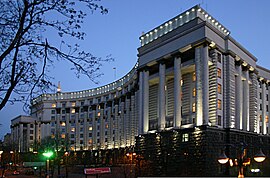Government of Ukraine
All government decisions are being voted for and adopted at the sessions of the cabinet by ministers only or heads of central offices of executive authority with ministerial status.Many central offices of executive authority without ministerial status may be part of a government ministry, while others function separately or support either the President of Ukraine or the Verkhovna Rada (parliament).There are three basic types of government sub-departments known as "central offices (organs) of executive authority": services, agencies, inspections.[6] Since August 2016, Ukrainians can sign and submit electronic petitions to the Cabinet of Ministers of Ukraine "to (assist with) the formation of the priorities of state policy and management decision-making".[7] According to Oleksandr Zapadynchuk, the process of establishing an administrative system in an already independent Ukraine started in the spring of 1991 when the Cabinet of Ministers of Ukraine (in place of the Council of Ministers of the Ukrainian SSR) was created, with new members of the government being appointed, as well as a new government office being formed.Members of the government (cabinet) are citizens of Ukraine, who have the right of vote, higher education, and possess the state language (Ukrainian).Members of the Cabinet and chief officers of central and local bodies of executive power may not combine their official activity with other work, except teaching, scholarly and creative activity outside working hours, and/or to be members of an administrative body or board of supervisors of an enterprise that is aimed at making profit.Normative legal acts of the Cabinet, ministries, and other central bodies of executive power are subject to registration.Every year no later than 15 September the Cabinet submits a bill on the State Budget of Ukraine to the Verkhovna Rada.[23] Three days later they also terminated the powers of five judges of the Constitutional Court of Ukraine appointed from the parliament's quota, for violating their oath.
Politics of UkraineoriginallyUkrainePrime MinisterVerkhovna RadaPresidentGovernment BuildingHrushevsky StreetUkrainianromanizedexecutive powerUkrainian SSRVitold FokinPrime Minister of UkraineSecretariat of Cabinet of MinistersNational Agency of Ukraine for Civil ServicePresident of UkraineShmyhal GovernmentDenys ShmyhalUkrainian TVelectronic petitionsConstitution of UkrainePeople's Deputy of Ukrainelegislative initiativeHeads of regional governmentPresidential representative of Ukraine in CrimeafactionsConstitutional Court of UkraineAnti-Monopoly CommitteeState Property FundState Committee for Television and Radio-broadcastingState Special Communications ServiceState Space AgencyCentral Election CommissionProsecutor GeneralNational BankNational Commission for State Regulation of Energy and Public UtilitiesReform Delivery OfficeUryadovy KuryerUkrinformCouncil of People's CommissarsBolshevikCouncil of Ministers of the Ukrainian SSRGeneral SecretariatCentral Council of UkraineRussian RepublicPeople's SecretariatCouncil of People's MinistersUkrainian People's RepublicGovernment ministries of UkraineMinistry of Internal AffairsMinistry of FinanceMinistry of Nationalities (later Foreign Affairs)Ministry of Agrarian AffairsWikisourceKyiv PostNational Academy for Public Administration112 UkraineUkrayinska PravdaInterfax-UkraineWayback MachineUkrainianPeople's RepublicVynnychenko IVynnychenko IILyzohubProvisional Workers' and Peasants' GovernmentRakovsky IRevolutionary CommitteeLyashko IKuchmaMasol IIMarchukPustovoitenkoYushchenkoKinakhYanukovych ITymoshenko IYekhanurovYanukovych IITymoshenko IIAzarov IAzarov IIYatsenyuk IYatsenyuk IIGroysmanHoncharukShmyhalActingFirst Vice Prime MinisterVice Prime Ministersgovernment ministriesEconomic Development and TradeAgricultureInfrastructureCulture and Strategic CommunicationsYouth and SportsDefenceEducation and ScienceSocial PolicyEnergy and Coal MiningFinanceForeign AffairsHealthcareInternal AffairsJusticeDigital TransformationNational Unity of UkraineVeterans AffairsEcology and Natural ResourcesStrategic IndustriesCommunities and Territories DevelopmentInformation PolicyFisheriesArchiveAviationBorder GuardEmergenciesMedications and Drugs ControlSpecial Communications and Protection of InformationStatisticson issues of Civil ServiceFishingPrevention of CorruptionAntimonopoly CommitteeEthics CouncilPension Fund


